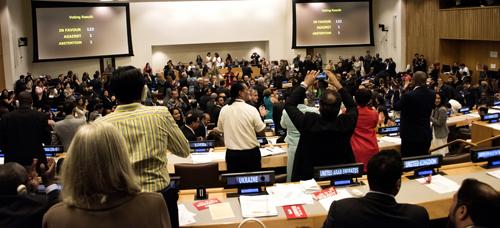
New York, 7 July 2017: Negotiations of a new international treaty that bans nuclear weapons concluded at the United Nations today as the treaty was formally adopted by states. The United Kingdom, alongside other nuclear-armed states, has boycotted the negotiations despite government claims to support multilateral disarmament and a world without nuclear weapons.
'States that are serious about eliminating nuclear weapons have joined the United Nations treaty negotiations to ban nuclear weapons and they represent the majority of states in the world,' said Richard Moyes of Article 36.
'The UK along with other states that possess nuclear weapons have chosen to boycott these talks, but the process has shown that any group of committed and concerned states can and should take collective responsibility to reject these horrific weapons,' said Moyes.
'This UN treaty outlaws nuclear weapons and requires their elimination,' said Dr Rebecca Johnson of the Acronym Institute for Disarmament Diplomacy. 'That's the logical order followed by all disarmament treaties, and whether the government likes it or not, it will increase the legal, economic and public pressures to halt Britain's billion-pound spending spree on Trident renewal.'
The 'Treaty to Prohibit Nuclear Weapons' was adopted Friday morning (New York time) and will open for signature by states at the United Nations in New York on 20 September 2017. Over 130 states have participated in negotiations since March 2017.
Since biological and chemical weapons have been banned for over 20 years, this UN treaty represents an important step to outlaw the most dangerous WMD of all, recognising that nuclear detonations, whether by accident or intention, would cause even greater catastrophic humanitarian consequences.
The Acronym Institute and Article 36 are international steering group members of the International Campaign to Abolish Nuclear Weapons (ICAN) which has led civil society's advocacy for the nuclear prohibition treaty for the past decade, and part of ICAN UK. They both participated in the UN negotiations, along with civil society leaders and organisations from the UK and around the world.

